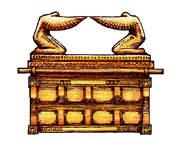Jews in Egypt
Hancock maintains that the Levites had in fact removed the ark, and it was not available for them to comply with the king's request. This we find unacceptable. The verse does support the idea that faithful Levites (or priests) had removed the ark for safekeeping in Manasseh's reign, but surely is telling us that the ark was in fact put back into the temple in Josiah's time. Given that this was so, the ark would surely have still been in the temple at the time of the Babylonian invasion of the land.
However, this does not affect Hancock's main theory, that the ark was removed to Egypt, since it could have been so removed immediately prior to the destruction of the city and temple by Nebuchadnezzar. There are two passages listing in some detail items looted by the Babylonians from the temple at Jerusalem - 2 Kings 25:13-17 and Jeremiah 52:17-23 - but neither mentions the ark, nor for that matter any of the items belonging to the holy place. It seems reasonable to suppose from this that they were taken away just before the destruction; and, though we cannot agree that the ark was taken out of the temple in Manasseh's day, we do accept that it could have been removed at the very end of the kingdom.
Hancock now comes up with
a new idea for the origin of the Falasha Jews. The idea
that they were the descendants of Jews who went to
Ethiopia in Solomon's time he dismisses, correctly we
believe, as pious legend. He is not satisfied, either,
with the normally accepted idea that they originated from
Jewish immigrants in the first and second centuries A.D.
He discovered from books written by two
nineteenth-century travellers amongst the Falashas that
they practised the Jewish feasts apart from Purim,
instituted at the time of Esther, and Hanukkah,
instituted at the time of the Maccabees. Since both these
feasts originated after the Babylonian captivity, he
concluded that the Falashas had left Israel before that
time. This view was confirmed by an interview with a
Falasha rabbi, who also had emigrated to Israel, who said
that his ancestors were Jews who had lived in Egypt, and
had built a temple there.
Next section: The Temple at Aswan

